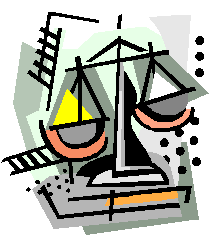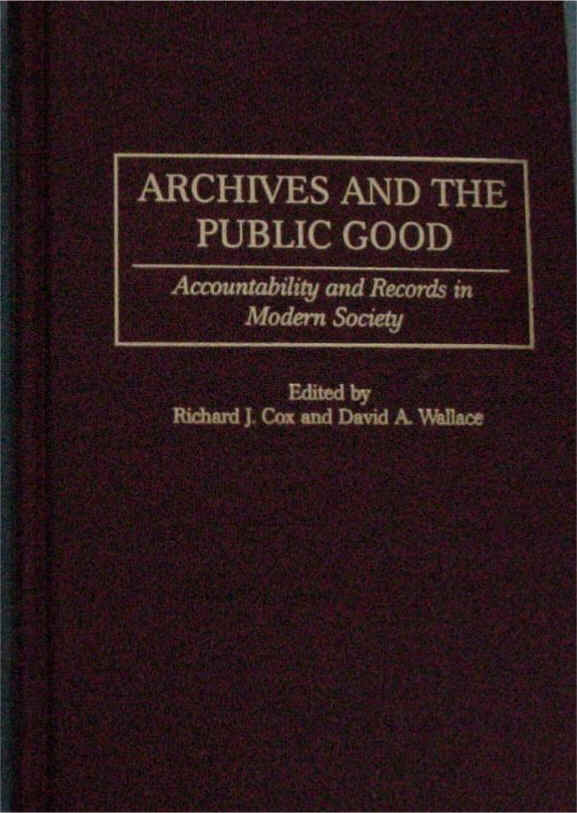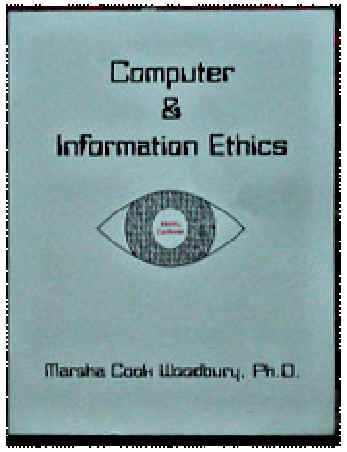 Ethical and Social Issues
Ethical and Social Issues Ethical and Social Issues
Ethical and Social Issues
Everything's got a moral, if you can only find it. —Lewis Carroll
![]() Ethics
Update: designed primarily to be used by
ethics instructors and their students. It is intended to provide resources and
updates on current literature, both popular and professional, that relates to
ethics. Thanks to Judith Turner for the
heads-up on this site.
Ethics
Update: designed primarily to be used by
ethics instructors and their students. It is intended to provide resources and
updates on current literature, both popular and professional, that relates to
ethics. Thanks to Judith Turner for the
heads-up on this site.
![]() Ethics, Accountability and Recordkeeping
in a Dangerous World, by Richard Cox, Facet
Publishing, London, 2006, pp. 352. Richard Cox, Professor,
Archival Studies at the University of Pittsburgh School of Information Sciences and editor of
Records and Information Management Report (RIMR), This most recent book by
one of the most distinguished and prolific educators, authors and editors in the
field of archives and records management ties together two distinct but highly
related topics of ethics and accountability as they impinge on the practice of
recordkeeping. Read the Table of Contents
and Chapter Four, "America's
Pyramids: Presidents
and Their Libraries," an
assessment of the history and development of presidential libraries that
concludes with a most provocative proposal for re-centralization of presidential
libraries in a single presidential library in or near Washington, D.C. under
NARA. (An earlier
version of this chapter previously appeared in Government
Information Quarterly 19
(2002) 45-75.)
Ethics, Accountability and Recordkeeping
in a Dangerous World, by Richard Cox, Facet
Publishing, London, 2006, pp. 352. Richard Cox, Professor,
Archival Studies at the University of Pittsburgh School of Information Sciences and editor of
Records and Information Management Report (RIMR), This most recent book by
one of the most distinguished and prolific educators, authors and editors in the
field of archives and records management ties together two distinct but highly
related topics of ethics and accountability as they impinge on the practice of
recordkeeping. Read the Table of Contents
and Chapter Four, "America's
Pyramids: Presidents
and Their Libraries," an
assessment of the history and development of presidential libraries that
concludes with a most provocative proposal for re-centralization of presidential
libraries in a single presidential library in or near Washington, D.C. under
NARA. (An earlier
version of this chapter previously appeared in Government
Information Quarterly 19
(2002) 45-75.)
Topics critical to the recordkeeping practice include:
* From
accountability to ethics, or when do records professionals become
whistleblowers?
* Testing the spirit of the information age
* Searching for authority: archivists and
electronic records in the new world at the fin-de-sičcle
* Searching for recognition: does strategic
information have ARMs?
* Why the nomination of the Archivist of
the United States is important to records professionals and society
* America's pyramids: Presidents and their
libraries
* The world is a dangerous place:
recordkeeping in the age of terror
* Technology, the future of work, and
records professionals
* Records and truth in the post-truth
society
* Censorship and records
* Personal notes: intellectual property,
technology, and unfair stories
![]() Richard
Cox's
2006 rejoinder to the controversy
over the "Sun Mad Raisins" cover, American Archivist cover (Vol. 66, No. 2,
Fall/Winter 2003). See also commentary by Bruce Buemmer's "Brown Shoes in a World of Tuxedos: Corporate Archives and
the Archival Profession."
Richard
Cox's
2006 rejoinder to the controversy
over the "Sun Mad Raisins" cover, American Archivist cover (Vol. 66, No. 2,
Fall/Winter 2003). See also commentary by Bruce Buemmer's "Brown Shoes in a World of Tuxedos: Corporate Archives and
the Archival Profession."
![]() "Brown Shoes in a World of Tuxedos: Corporate Archives and
the Archival Profession," by Bruce
Bruemmer, Director of Corporate Archives, Cargill, Inc., a
presentation at the 2006 joint annual
conference of the National Association of Government Archivists and Records
Administrators (NAGARA), the Council of
State Archivists (CoSA) and
Society of American Archivists (SAA) in
Washington, D.C. The paper is an abbreviated version of a chapter that will appear in Documenting Society and Institutions, Essays in Honor of Helen Samuels,
Terry Cook, editor, planned for publication in 2007.
It includes a discussion of business recordkeeping ethics and
rejoinder to Richard Cox's commentary in the American
Archivist, Vol. 68, No. 1, Spring/Summer 2005 on the
earlier American Archivist "Sun Mad Raisin" cover
issue. See also, Richard
Cox's rejoinder to the controversy.
"Brown Shoes in a World of Tuxedos: Corporate Archives and
the Archival Profession," by Bruce
Bruemmer, Director of Corporate Archives, Cargill, Inc., a
presentation at the 2006 joint annual
conference of the National Association of Government Archivists and Records
Administrators (NAGARA), the Council of
State Archivists (CoSA) and
Society of American Archivists (SAA) in
Washington, D.C. The paper is an abbreviated version of a chapter that will appear in Documenting Society and Institutions, Essays in Honor of Helen Samuels,
Terry Cook, editor, planned for publication in 2007.
It includes a discussion of business recordkeeping ethics and
rejoinder to Richard Cox's commentary in the American
Archivist, Vol. 68, No. 1, Spring/Summer 2005 on the
earlier American Archivist "Sun Mad Raisin" cover
issue. See also, Richard
Cox's rejoinder to the controversy.
Ethics and the Archival Profession: Introduction and Case Studies, by Karen Benedict, a book review by Rick Barry for the American Archivist.
![]() "Ethics
and Social Issues for Creators, Managers and Users of Records,"
by Rick Barry, a keynote presentation at the
Liverpool
University Centre for Archive Studies (LUCAS) Conference on "Political
Pressure and the Archival Record," July 24, 2003. The proceedings of this
conference have been published in Political Pressure and the Archival
Record. See publication
details for a commentary by Eric Ketelaar, Professor of Archivistics,
University of Amsterdam, and Honorary Professor, Monash University, Melbourne,
Australia.
"Ethics
and Social Issues for Creators, Managers and Users of Records,"
by Rick Barry, a keynote presentation at the
Liverpool
University Centre for Archive Studies (LUCAS) Conference on "Political
Pressure and the Archival Record," July 24, 2003. The proceedings of this
conference have been published in Political Pressure and the Archival
Record. See publication
details for a commentary by Eric Ketelaar, Professor of Archivistics,
University of Amsterdam, and Honorary Professor, Monash University, Melbourne,
Australia.
![]() "Keeping
the record, keeping the trust" by Rick
Barry originally published in the January, 2000, Newsletter of
the British Society of Archivists. This is about a
few of the social, human factors and ethical issues – let us say 'social
issues' for short – of some millennial proportion that are bearing down on ARM
professionals: privacy and the sale of public records; public alienation from
government; and the role of ARM professionals in ethical violations.
"Keeping
the record, keeping the trust" by Rick
Barry originally published in the January, 2000, Newsletter of
the British Society of Archivists. This is about a
few of the social, human factors and ethical issues – let us say 'social
issues' for short – of some millennial proportion that are bearing down on ARM
professionals: privacy and the sale of public records; public alienation from
government; and the role of ARM professionals in ethical violations.
![]() "Thinking about accountability, recordkeeping and
Shelley Davis' Unbridled Power : a commentary", by Rick Barry. A new look at a
fascinating book, Unbridled Power:
Inside the Secret Culture of the IRS, by Shelley L. Davis originally published
as a book review by Rick Barry and later developed by him in this essay raising
questions for the archives and records management community, policy makers and
society.
"Thinking about accountability, recordkeeping and
Shelley Davis' Unbridled Power : a commentary", by Rick Barry. A new look at a
fascinating book, Unbridled Power:
Inside the Secret Culture of the IRS, by Shelley L. Davis originally published
as a book review by Rick Barry and later developed by him in this essay raising
questions for the archives and records management community, policy makers and
society.
![]()
 Archives and the Public
Good, Richard
Cox,
Professor, Archival Studies at the University of Pittsburgh School
of Information Sciences and David Wallace,
Assistant Professor at
the School of Information, University of Michigan.
Editors,
Greenwood Press, 2002.
Read the Table of
Contents and the Introduction; and read about the many outstanding Contributors to this book.
This book should be required reading for all educators and students of archives and records
management, and for executives who want to avoid ruin over absent or misused
records.
Archives and the Public
Good, Richard
Cox,
Professor, Archival Studies at the University of Pittsburgh School
of Information Sciences and David Wallace,
Assistant Professor at
the School of Information, University of Michigan.
Editors,
Greenwood Press, 2002.
Read the Table of
Contents and the Introduction; and read about the many outstanding Contributors to this book.
This book should be required reading for all educators and students of archives and records
management, and for executives who want to avoid ruin over absent or misused
records.
![]() "Former
President Giuliani and His Library?" by
Richard Cox
This op-ed piece was submitted by Richard Cox to the New York Times, which,
regrettably, did not publish the piece. It constitutes an excellent commentary
on the importance of the public records of elected officials.
"Former
President Giuliani and His Library?" by
Richard Cox
This op-ed piece was submitted by Richard Cox to the New York Times, which,
regrettably, did not publish the piece. It constitutes an excellent commentary
on the importance of the public records of elected officials.
![]() The
ABA's Formal Opinion 06-442 on reading metadata
in electronic documents: summary, by John
Wesley Hall. Provides ethical guidance on reading metadata in electronic documents
provided by one's opponent.
The
ABA's Formal Opinion 06-442 on reading metadata
in electronic documents: summary, by John
Wesley Hall. Provides ethical guidance on reading metadata in electronic documents
provided by one's opponent.
![]() Political Pressure and
the Archival Record Revisited: "The Role of the Archives in Protecting the
Record from Political Pressure," by Chris Hurley.
This is an August 2004
reprise and update of a paper originally presented at the LUCAS Conference in Liverpool,
July 2003. It was presented to the ICA 2004
- Archives, Memory & Knowledge, Conference, August 25, 2004.
Political Pressure and
the Archival Record Revisited: "The Role of the Archives in Protecting the
Record from Political Pressure," by Chris Hurley.
This is an August 2004
reprise and update of a paper originally presented at the LUCAS Conference in Liverpool,
July 2003. It was presented to the ICA 2004
- Archives, Memory & Knowledge, Conference, August 25, 2004.
![]() “Recordkeeping,
Document Destruction, and the Law (Heiner, Enron, and McCabe)”
by Chris Hurley.
This
paper on legal and ethical issues surrounding the improper destruction of
records is
a revised version of an article that originally appeared in Archives
& Manuscripts in the issue for November 2002 (Vol. 30, No. 2) pp. 6 -
25.
Hurley was awarded the Michael Standish Prize by the Archives &
Records Association of New Zealand (ARANZ) for this paper.
“Recordkeeping,
Document Destruction, and the Law (Heiner, Enron, and McCabe)”
by Chris Hurley.
This
paper on legal and ethical issues surrounding the improper destruction of
records is
a revised version of an article that originally appeared in Archives
& Manuscripts in the issue for November 2002 (Vol. 30, No. 2) pp. 6 -
25.
Hurley was awarded the Michael Standish Prize by the Archives &
Records Association of New Zealand (ARANZ) for this paper.
![]() "The
role of the archives in protecting the record from political pressure,"
by Chris Hurley,
keynote presentation to the Liverpool University International
Conference on Political Pressure and the Archival Record, 22-25 July 2003
and
to
be
published in the forthcoming Proceedings of that conference by the Society
of American Archivists.
"The
role of the archives in protecting the record from political pressure,"
by Chris Hurley,
keynote presentation to the Liverpool University International
Conference on Political Pressure and the Archival Record, 22-25 July 2003
and
to
be
published in the forthcoming Proceedings of that conference by the Society
of American Archivists.
![]()
 Computer
& Information Ethics, by
Marsha Cook Woodbury, PhD, Stipes
Publishing, Champaign, IL, 2002, ISBN 1-58874-155-9. Marsha is a faculty member of the
Department of Computer Science of the University of Illinois at Urbana-Champagne
and is a former board member of Computer
Professionals for Social Responsibility. Read
the Table
of Contents
and Introduction. "Technology
is driving the future: Who is doing the steering?...Taking
time to think about computer and information ethics will not supply set answers
to the choices we have to make, but it will prod us to reflect, ponder,
evaluate, learn, and cogitate." This
book should be required reading for all educators and students of information
management, including archives and records management, and for current
practitioners such as CIOs, CTOs, IT Directors and the people who work for them.
Computer
& Information Ethics, by
Marsha Cook Woodbury, PhD, Stipes
Publishing, Champaign, IL, 2002, ISBN 1-58874-155-9. Marsha is a faculty member of the
Department of Computer Science of the University of Illinois at Urbana-Champagne
and is a former board member of Computer
Professionals for Social Responsibility. Read
the Table
of Contents
and Introduction. "Technology
is driving the future: Who is doing the steering?...Taking
time to think about computer and information ethics will not supply set answers
to the choices we have to make, but it will prod us to reflect, ponder,
evaluate, learn, and cogitate." This
book should be required reading for all educators and students of information
management, including archives and records management, and for current
practitioners such as CIOs, CTOs, IT Directors and the people who work for them.
![]() For
analysis of the Australian "Heiner Case" that is discussed in several
of the above papers, see details on the Justice
Project.
For
analysis of the Australian "Heiner Case" that is discussed in several
of the above papers, see details on the Justice
Project.
Back to Home Page